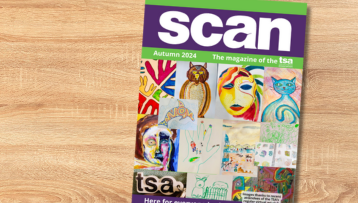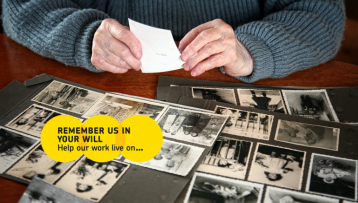In the current global situation, it is understandable to have concerns about how covid-19 may impact on a loved one’s stay in a residential home. This is especially true for those in the TSC community, and has been an emerging issue for some people accessing the TSA Support Line.
The recommendations that care providers are implementing to reduce the risk of covid-19 and manage stretched capacity due to its impact varies across all providers. This makes giving clear guidelines for the TSC community difficult, as everyone’s situation is different. The Coronavirus Act has added further hurdles, with local authorities permitted to relax their duties to carry out needs assessments and maintain care packages as a result of services becoming extremely stretched.
Some common concerns by members of the TSC community at the moment include whether effective measures are in place to prevent the spread of covid-19, how visits are being managed, or if there have been changes to the type of care that a loved one receives.
At the TSA, we want to do everything we can to help families and care providers come to positive solutions that reduce any concerns whilst ensuring that a loved one’s care needs are met. We believe that the best way to achieve this is through open and informed discussions between families and care providers that cover any concerns that families might have.
Below, you’ll find a list of possible questions that you may want to ask your care provider to help to get clarity on covid-19 prevention, residential visits and changes in care packages.
It is also important to remember that someone’s care package should not be reduced without a proper review of their needs assessment and/or support plan. You can read more about the purpose and importance of a needs assessment in this booklet by Mencap.
If you are being affected by the challenges of keeping in touch with a loved one who is in residential care, remember that the TSA Support Line is here for you: 0808 801 0700 / support@tuberous-sclerosis.org.
This should help to confirm that clear guidelines on social distancing have been put into place by the care provider, but not at the expense of caring for your loved one or in continuing to maintain a good quality of life for them.
It is reasonable to expect that staff will have completed some form of training, such as instructions on one-way systems in the facility, or minimising risks during direct care activities, such as bathing or clothing.
You may want to see if private testing is an option, or whether the provider is relying on NHS screenings.
Although you should expect cleaning regimes to be of the highest quality at all times, it is reasonable to ask whether additional cleaning rotas or external cleaning agencies are being recruited with the specific aim of helping to minimise the spread of covid-19.
It may not be a simple yes/no answer, as visits could perhaps be restricted or limited to allow for social distancing. There could also be restrictions on where a visit could take place, such as in a garden.
Some of the measures you might expect in care homes that are permitting visits include:
- Social distancing
- Only one visitor per resident
- Outdoor visits only (either in the care home garden, or an outdoor public space)
- PPE worn by visitors
- Visitor booking system
Care providers may be willing and able to offer contact through phone and video calls. However, we understand that for some people living with TSC and their families, video calls can be upsetting, such as if a loved one is non-verbal.
For some families and individuals living in residential care, something as simple as a wave through a window could make all the difference. It is therefore important to communicate with the care provider how you feel would be best for your family to keep in touch, whilst keeping safe.
It is reasonable to ask for and to be talked through the protocol(s) being used by the provide to decide on whether in-person visits are being permitted (and how they are happening). This may not only give you peace of mind, but could perhaps highlight areas for the provider to work on or reconsider.
Try and ensure that the provider agrees to give you regular updates as and when they are needed, so that you and your family can be confident and comfortable that you are up-to-date on the latest changes. This can help ensure that there are no difficult surprises and help to make any changes, which could be hard to hear, easier to deal with.
Asking this question can help ensure that you are doing everything that you can in partnership with the care provider, but also prompts the provider to critically evaluate their own work
.
[The following points may be useful if you are not happy about any changes made to a loved one’s care package as a result of coronavirus]
If you have not received a notice of the decision to make changes to the care package, it would be useful to ask for this decision in writing and the reasons for it, alongside a copy of your loved one’s most recent needs assessment and care and support plan.
It is recommended that you have conversations regarding care packages over email, so that a paper trail can be maintained. You might also find it useful to give a deadline to receive a response. You may wish to use this letter, provided by Mencap, to request this notice in writing.
A care package should not be reduced without a needs assessment or support plan review. The recommended way to challenge any reduction in support is to request a copy of the completed needs assessment and the latest care and support plan, as suggested. If the changes to the care package mean that your loved one is no longer receiving the essential care that they were initially assessed as needing, then there is a strong argument that this could breach human rights law.
For more information on the government policies for visiting arrangements in residential care homes, please visit the link for your nation below:
Wales: https://gov.wales/visits-care-homes-guidance-providers-html
Scotland: https://www.gov.scot/publications/coronavirus-covid-19-adult-care-homes-visiting-guidance/
Northern Ireland: https://www.health-ni.gov.uk/publications/covid-19-guidance-nursing-and-residential-care-homes-northern-ireland
Make a one off or regular donation
£10 Can allow us to send a welcome pack to a family who has just received a life-changing TSC diagnosis, ensuring that they do not go through this time alone.
£25 Can help us develop materials that are included in our support services, flagship events or campaigns.
£50 Can provide laboratory equipment for a day’s research into the causes, symptoms, management or treatment of TSC.
To provide help for today and a cure for tomorrow



























































































































